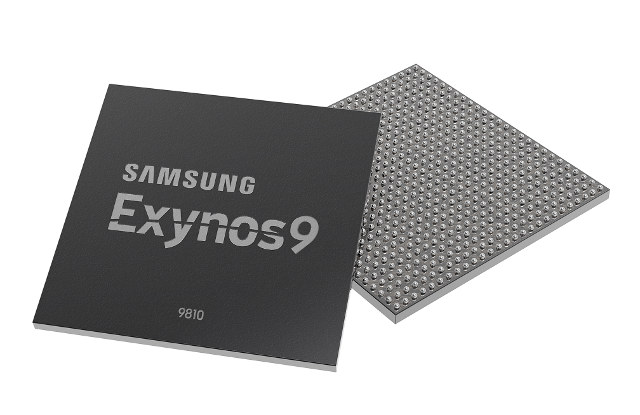Samsung Electronics has just announced the launch of Exynos 9 Series 9810 (Exynos 9810) manufactured with Samsung’s 10-nm FinFET process, featuring an eight core processor clocked up to 2.9 GHz, a gigabit (1.2 Gbps) LTE modem and deep learning-enhanced image processing.
Single core performance is aud to be improved by two-fold, while multi-core performance gets a 40% improvement compared to the previous generation chip, which should be Exynos 8895. ARM Mali-G72 GPU is said to bring more realistic graphics along with 20% more performance.
Samsung Exynos 9810 specifications with extra cache and memory info from Anandtech:
- CPU
- Quad core custom Exynos M3 @ up to 2.9GHz optimized for performance; 512KB L2 cache per core
- Quad-core Arm Cortex-A55 @ up to 1.9GHz optimized for efficiency; 128KB L2 cache per core
- GPU – Arm Mali-G72MP18
- Memory – LPDDR4x (4x 16-bit @ 1794 MHz)
- Storage – UFS 2.1, SD 3.0
- Display – Up to WQUXGA (3840×2400), 4K UHD (4096×2160)
- LTE Modem – LTE Cat.18 6CA 1.2Gbps (DL) / Cat.18 2CA 200Mbps (UL)
- GNSS – GPS, GLONASS, BeiDou
- Camera – Rear 24MP, Front 24MP, Dual Camera 16+16MP
- Video – 4K UHD 120fps recording and playback with 10-bit HEVC (H.265), H.264, VP9 Codec
- Process – 2nd gen. Samsung 10nm FinFET Process
The company did not provide much details about deep-learning acceleration, except it will leverage hardware and software…:
Exynos 9810 introduces sophisticated features to enhance user experiences with neural network-based deep learning and stronger security on the most advanced mobile devices. This cutting-edge technology allows the processor to accurately recognize people or items in photos for fast image searching or categorization, or through depth sensing, scan a user’s face in 3D for hybrid face detection. By utilizing both hardware and software, hybrid face detection enables realistic face-tracking filters as well as stronger security when unlocking a device with one’s face. For added security, the processor has a separate security processing unit to safeguard vital personal data such as facial, iris and fingerprint information.
The Exynos 9 Series 9810 is currently in mass production, and should be found in smartphones, personal computing devices, and automotive products later this year. More details can be found on the product page.

Jean-Luc started CNX Software in 2010 as a part-time endeavor, before quitting his job as a software engineering manager, and starting to write daily news, and reviews full time later in 2011.
Support CNX Software! Donate via cryptocurrencies, become a Patron on Patreon, or purchase goods on Amazon or Aliexpress






Also last year’s flagship Exynos – the 8895 (the one in the S8) had the theoretical ability to record 4K@120. But the S8 can only record 4K@30. So what’s the explanation for this?!
My guess is that Samsung is limiting its SoC capabilities, only because of the SD835 version, which is limited to 4K@30.
Is it possible to enable the S8 to record 4K@120? Maybe using a different ROM?
And SD845 is limited to 4K@60 – so it is expected that the S9 would, again, be limited – this time to 4K@60.
So what’s the point of making a SoC which is capable of 4K@120, if all the devices that use it can’t utilize its full potential?!
Why not enable the exynos version to use its full potential, no matter that the minority of the model’s users (the ones with Snapdragon) would have inferior capabilities?!
And yes – I know that apple is doing a similar thing with its modem – limiting the Qualcomm one, just because other varieties have an inferior Intel modem. But theoretical modem capabilities (which are also limited by the networks capabilities) are much less important than video recording capabilities!
I hope Odroid will produce an SBC with this chip on it!
@Paul M
Hardkernel will likely not be able to get that processor, but I’m hoping they may get one of the previous generation that would still be an upgrade to Exynos 5422.